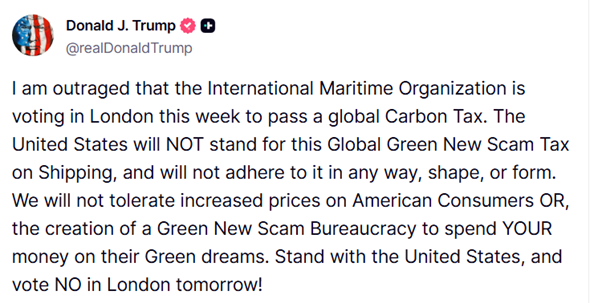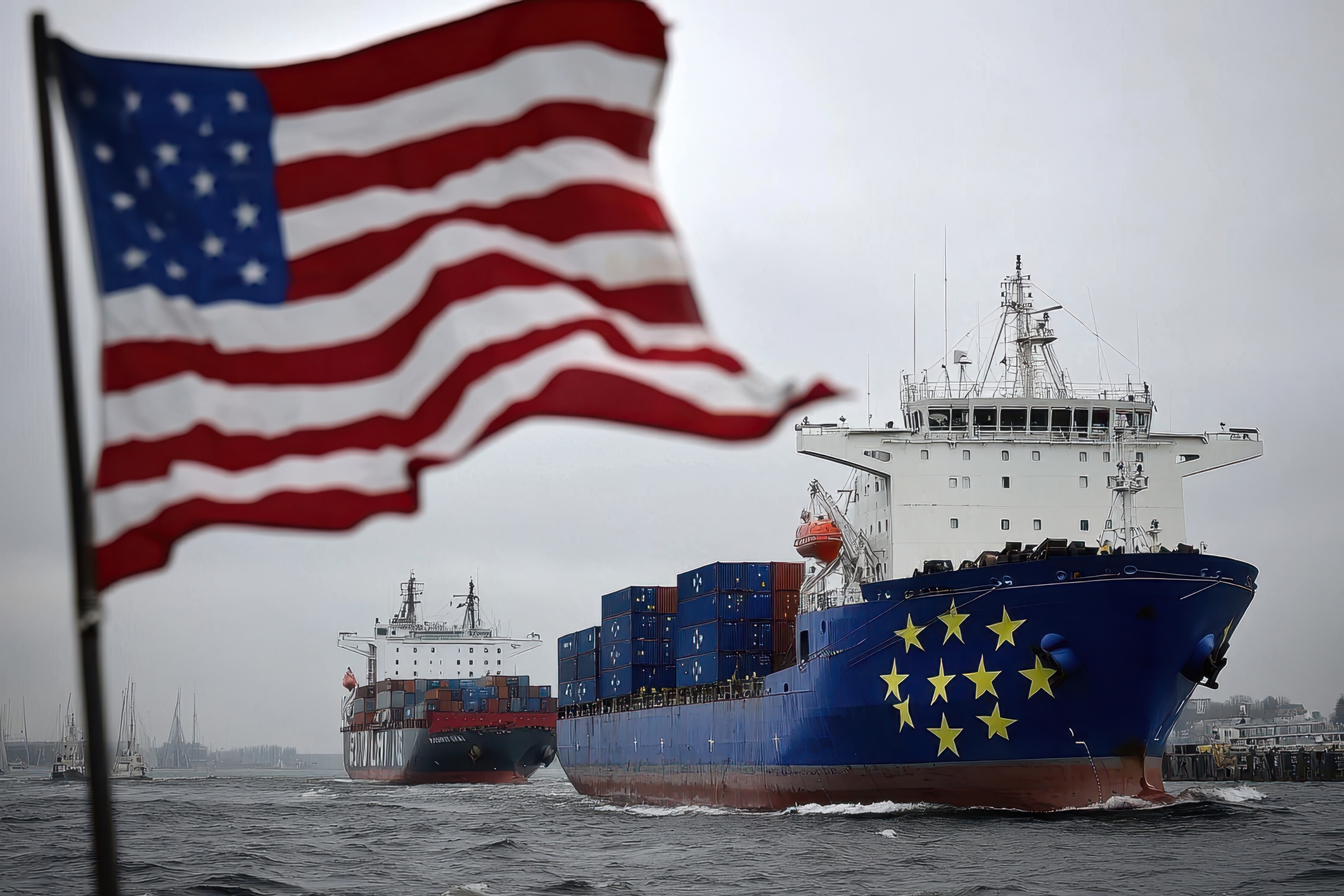A fierce Trump administration push to stop the global shipping industry from paying for its own climate pollution appeared to have been successful Friday, as efforts to approve the “world’s first global carbon tax” collapsed.
It had been widely assumed the tax would be adopted during during the extraordinary session of the Marine Environment Protection Committee in London at the International Maritime Organization.
But after four days of tough negotiations, countries agreed to delay a vote on whether to approve it by 12 months. The delay follows pressure and procedural tactics from the United States and other countries, pushing the adoption vote to October 2026.
U.S. Secretary of State Marco Rubio confirmed Friday afternoon that the Trump administration “prevented a massive UN tax hike on American consumers that would have funded progressive climate pet projects.”
“This is another HUGE win for POTUS,” the US secretary said in a post on X.
The US president Donald Trump has voiced its stance against the first of its kind global carbon tax, warning IMO member states to vote against the organisation’s Net-Zero Framework aimed at reducing global greenhouse gas emissions from the international shipping sector.
In a late-night post on his Truth Social platform on Thursday, Trump slammed the global carbon tax and slandered it for being a “Global Green New Scam Tax on Shipping.”
In a statement on Truth Social, Donald Trump said the United States would not comply with the measure and vowed to resist in any way, shape or form. Trump urged supporters to back the US stance and vote against the global carbon tax.
Expressing his staunch opposition to the framework, he wrote on Thursday (US time), “I am outraged that the International Maritime Organization is voting in London this week to pass a global Carbon Tax. The United States will NOT stand for this Global Green New Scam Tax on Shipping, and will not adhere to it in any way, shape, or form.”
He went on to say, “We will not tolerate increased prices on American Consumers OR, the creation of a Green New Scam Bureaucracy to spend YOUR money on their Green dreams. Stand with the United States, and vote NO in London tomorrow.”
Trump’s remarks on the issue followed shortly after US Secretary of State Marco Rubio said the day before that the current administration will not allow the UN to tax American citizens and companies.
On October 15, the US Secretary of State said on X that the US would be a “hard NO” on the IMO measures.
He also called on other nations to “stand alongside the US in defence of our citizens and sovereignty.”
Rubio linked his post to a Wall Street Journal article that said the “new global climate tax would be the ultimate in taxation without representation.”
Secretary of State Marco Rubio said, “This week, the UN is attempting to pass the first global carbon tax, which will increase energy, food, and fuel costs across the world. We will not allow the UN to tax American citizens and companies.
“Under the leadership of POTUS, the U.S. will be a hard NO. We call on other nations to stand alongside the United States in defense of our citizens and sovereignty.”
The Trump administration had earlier made it clear that the United States will not accept any “policy that unduly or unfairly burdens the United States or harms the interests of the American people.”
The United States threatened to use visa restrictions, commercial penalties, additional port fees on ships owned, operated, or flagged by countries supporting the framework and sanctions on officials “sponsoring activist-driven climate policies,” to retaliate against nations that back IMO’s proposed carbon tax that aims to reduce global greenhouse gas emissions from the international shipping sector. The envisaged measures include potentially blocking vessels registered in those countries from U.S. ports.
In a joint statement on Oct. 10, Secretary of State Marco Rubio, Secretary of Energy Chris Wright, and Secretary of Transportation Sean Duffy expressed strong opposition to a global tax regime that levies, as they said, “punitive and regressive financial penalties.”
The administration argued they “unequivocally reject” the proposal and warned they “will fight hard to protect our economic interests by imposing costs on countries if they support the NZF.” “Our fellow IMO members should be on notice,” they said.
Officials warned they could impose visa restrictions including an increase in fees and processing, mandatory re-interview requirements and/or revisions of quotas for C-1/D maritime crew member visas; commercial penalties stemming from U.S. government contracts including new commercial ships, liquified natural gas terminals and infrastructure, and/or other financial penalties on ships flagged under nations in favor of the NZF; and additional port fees on ships owned, operated, or flagged by countries supporting the framework.
They also threatened they will pursue investigations and consider potential regulations to combat anti-competitive practices from certain flagged countries and potentially block vessels registered in those countries from U.S. ports. They will also evaluate, among other measures under consideration, sanctions on officials sponsoring activist-driven climate policies that would burden American consumers.




